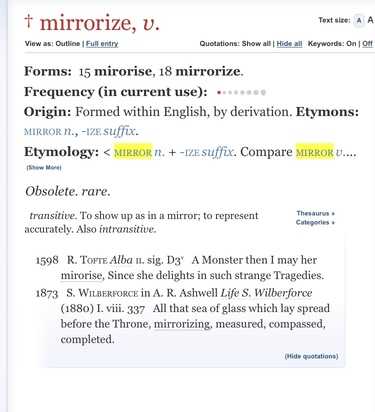Mirrorer does exist, it is just very rare, and possibly not found in any dictionaries. But here are three examples from Google Books of it being used (bolding added by me):
-
Remember the mirroring experiment in Chapter 11? When you mirror someone else's physiology, you're able to experience not only the same state, but also the same sorts of internal experiences and even the same thoughts. Now, what if you could do that in everyday life? What if you became such a skillful mirrorer you could know what someone else was thinking?
(Unlimited Power: a Black Choice, by Anthony Robbins and Joseph McClendon III (1997), p. 264)
-
Should you, on the other hand, unearth a bad comedian who manifests a mad, passionate desire to mirror your movement, there is at least one terrible revenge. Encourage the mirrorer (you're, presumably, the mirroree) to duplicate one simple movement.
(Street Mime, by James W. Gousseff (1993), page 21)
-
The method involves the endless search for perfect mirroring or for the perfect mirrorer--in other words, the idealized, perfect object.
("Introduction to the Disorders of the Self", by Ralph Klein, p. 42; in Psychotherapy of the Disorders of the Self, pp. 30-46; edited by James F. Masterson and Ralph Klein (1989))
The pronunciation is obviously awkward, but that didn't prevent these authors from using it when they needed a word meaning "someone who mirrors/is mirroring".
The spelling "mirroror" is not a Latinate form, and I don't think it's as likely as the spelling "mirrorer"
I think that the form "mirrorer" is both more likely and more preferable than the form "mirroror". As I explain in my answer to the question that you linked to, "-or" is not just a suffix used on verbs of any form that in some way come from Latin. In Latin, the agent noun suffix was really "-tor" or "-sor", so agent nouns in "-or" that come from Latin generally only exist for verbs that end in "t" (actor), "s" (suppressor) or "se" (supervisor). There are also some -tor and -sor agent nouns that are not actually attested in Latin, but that look like possible Latin agent noun forms.
Mirroror does not look like a Latin agent noun form. The verb "mirror" does not end in "t" or "s". It is an English "verbing" of a French noun. The French noun actually already ended in the French agent suffix "(e)or" (a suffix that was derived from Latin "tor" with weakening of the consonant "t"). Since the word mirror is neither Latin nor a verb in form, it can't really take a Latin agent noun suffix.
There is an English agent noun suffix -or, derived from the French suffix (e)or mentioned above. This -or suffix is found in words like sailor and settlor, but it is less usual and less productive as a means of forming new agent nouns than the suffix -er.
"mirrorizer" would be the agent noun of the verb "mirrorize", not of the verb "mirror"
The form "mirrorizer" doesn't look impossible to me, but it would not be an agent noun corresponding to the verb "mirror". It corresponds to the alternative verb "mirrorize."

